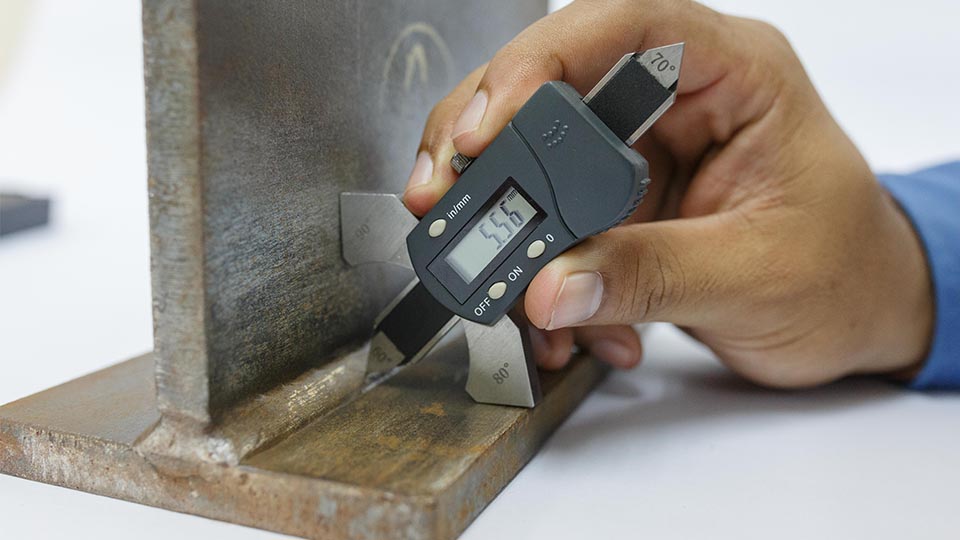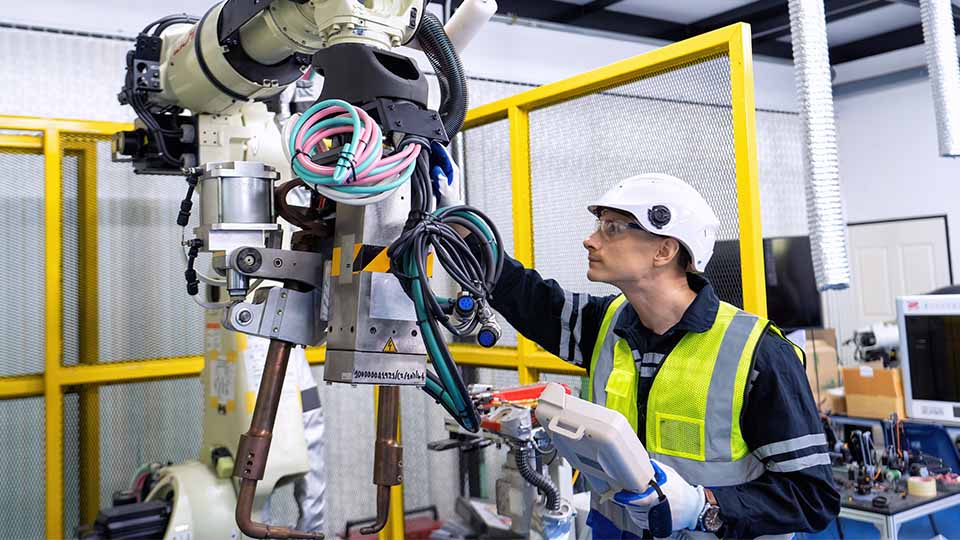Welcome to my article on weld engineering jobs in Michigan! I will share lots of welding advice on the job market. If you are new to welding, or a veteran, you should find valuable weld information and insights to help you lead a successful welding career and achieve your professional goals.
Weld Engineering Jobs:
Weld engineering jobs in Michigan are abundant across multiple industrial sectors. Suppose you are looking for a challenging welding engineering career where you can manufacture automobiles, create aerospace products, and build military equipment and other heavy equipment machinery used in construction and agriculture. If that sounds interesting, then the welding industry in the Michigan area is a perfect fit for you.
Weld engineering jobs in Michigan provide many employment opportunities in a manufacturing facility because Michigan is a hub for manufacturing in the United States. A skilled welder fabricator, weld technician, or weld engineer can easily find work in the state.
Did you know?
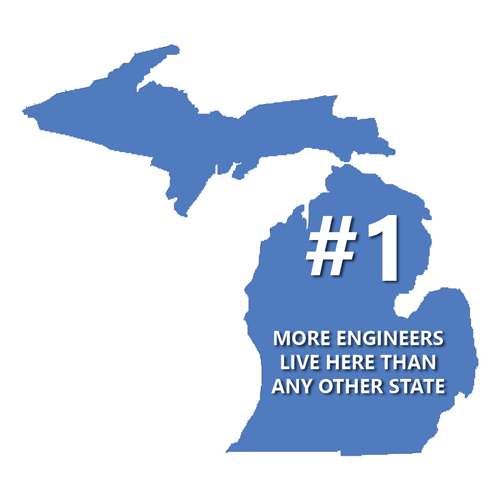
What is a weld engineer?
A welding engineer is a tradesperson who uses various processes to join metal pieces together. Welding is a fabrication process that involves melting and fusing metal to create a permanent bond. Welders use multiple tools and techniques to cut and shape metal and may work on projects ranging from minor repairs to large construction projects. Welders often specialize in one type of welding process, such as GMAW (gas metal arc welding), SMAW (shielded metal arc welding), or TIG (tungsten inert gas welding), and they may also be trained in other metalworking techniques, such as soldering and brazing.
What does a weld engineer do?
A welder typically performs the following tasks:
- Reading and interpreting blueprints, drawings, and customer specifications to determine the appropriate welding process and equipment.
- Setting up and testing welding equipment and selecting the appropriate filler materials.
- Examining workpieces for defects and measuring and marking their dimensions.
- Positioning and clamping workpieces together or using jigs or fixtures to hold them in place.
- Operating welding equipment to produce high-quality welds.
- Inspecting and testing completed welds to ensure they meet the required standards.
- Maintaining and repairing welding equipment and machines.
- Keeping accurate records of work performed.
- Provide expertise with the three common weld processes: RSW, GMAW, and GTAW.
- Use welding equipment to build products that meet product designs.
- Set weld parameters and perform weld testing to pass customer specifications.
- Use welding robots to perform the manufacturing process.
- Are responsible for weld safety in the process design and during the daily execution of welding procedures.
- Ensure all welding techniques and standards comply with practices, procedures, and instructions.
Skilled welders may work in factory settings like construction sites, manufacturing, and repair shops. They may work with multiple materials, including steel, aluminum, and
Types of Welding Technologies:
Below, I describe the different types of welding technologies used by weld engineers in the industrial manufacturing sectors, such as:
- Gas Tungsten Arc Welding (GTAW or TIG welding)
- Resistance Spot Welding (RSW)
- Plasma Arc Welding (PAW)
- Shielded Metal Arc Welding (SMAW)
- Projection Welding (PW)
- Capacitor-Discharge Welding (CD)
- Drawn Arc Stud Welding (DAW)
- Gas Metal Arc Welding (GMAW or MIG welding)
- Laser Beam Welding (LBW)
- Submerged Arc Welding (SAW)
- Flux Cored Arc Welding (FCAW)
- Friction Stir Welding (FSW)
- Ultrasonic Welding (USW)
- Induction Welding (IW)
- Electron Beam Welding (EBW)
- Electroslag Welding (ESW)
- Thermite Welding (TW)
Many weld engineers are also tasked with becoming joining engineers and must learn about mechanical joining processes like:
- Self-Piercing Riveting (SPR)
- Clinching
- Flow Drill Screwing (FDS)
- Adhesive Bonding (Gluing or Sealing)
- Press Fitting
Types of Welding Equipment:
Below, I list commonly used welding equipment that welding engineers will need to know how to operate in order to perform their job tasks:
- MIG welding equipment
- TIG welding equipment
- Resistant spot welding equipment
- Projection welding equipment
- Laser welding equipment
- Drawn arc stud welding equipment
- Shielded metal arc welding equipment
- Welding helmet
- Welding cables
- Ground cables
- Gas cylinder
- Welding gun
- Filler material
- Filler rod
- Welding wire
- Welding rod
- Welding consumables
- Welding power supplies (welding machines)
What are welding supplies?
Welding supplies are items that are used in the process of welding at a person’s welding station. These can include things like:
- Welding helmets: A protective helmet worn by the welder to shield the face and neck from sparks and intense light.
- Welding gloves: Heavy-duty gloves protect the hands from heat and burns.
- Welding jacket: A protective jacket worn to protect the body from sparks and splatters.
- Welding rods: Metal rods are used as filler material in the welding process.
- Welding wire: Wire used as filler material in the welding process.
- Welding machine: A machine that generates the heat needed to melt and fuse metal.
- Gas tanks: Tanks containing the gas (such as argon or carbon dioxide) used in some welding processes.
- Chipping hammer: A tool to remove slag (a byproduct of the welding process) from the weld.
- Pliers: Pliers are often used to grip and manipulate materials during the welding process.
- Grinding wheel: A wheel made of abrasive material that smooths and shapes metal.
Educational requirements in weld engineer job descriptions:
Many weld engineering jobs in Michigan require a secondary educational background or trade school certificate before applying. However, with over 25 schools in Michigan offering a two-year associate welding technology program, Ferris State University is the only school that provides a full four-year bachelor’s degree program in welding engineering technology. In addition, a bachelor’s degree program may be required for welding engineer employment.
An education in welding technology?
Please look below at some of our favorite welding engineering technology colleges and universities all over Michigan that offer some type of welding classes.
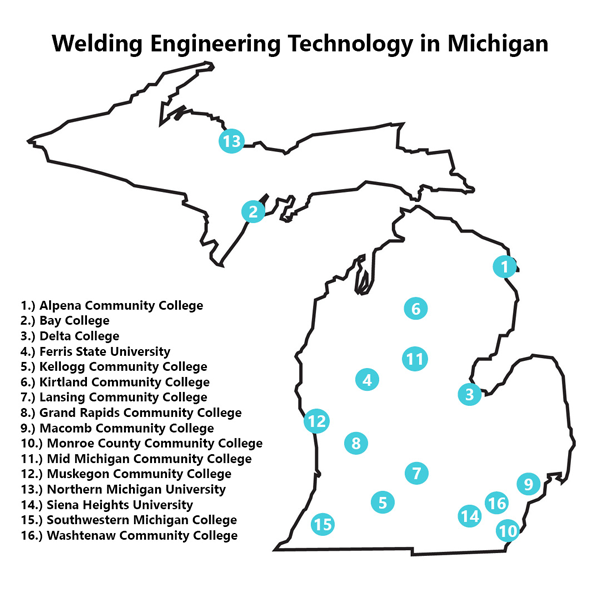
Welder Certification:
If you are looking for a higher salary and more job security, receiving a welding certification is a great way to boost your career. If you want to advance your career with a welding certification from the American Welding Society (AWS), check out its list of professional certifications the AWS offers.
In addition, earning your welding certification from the American Welding Society will show your employer that you want to continue learning about welding and have the drive to succeed – both are great qualities for leadership roles within your company. A certified welding inspector from the American Welding Society can earn a much larger wage than a more experienced welder without a welding certification.
Types of Weld Engineering Jobs in Michigan:
Michigan has a lot of welding jobs in the State. Below, I talk about the 4 most common roles for weld engineers to find work in Michigan.
Automotive Welding Jobs:
There has been tremendous weld engineering growth in the automotive industry due to the high demand for welded and joined products, from the push to lightweight vehicles to meet gas mileage specifications and CO2 efficiency requirements.
In addition to working for the Big Three (General Motors, Ford Motor Company, and Stellantis North America), which all have their headquarters in the Detroit metropolitan area, an individual could also work for one of the hundreds of their automotive manufacturing tier suppliers in the Detroit area.
Generally, automotive suppliers will pay weld engineers a more extensive base salary. Still, they may have to work overtime and weekends, while those weld engineers who work for the Big Three usually have a lower wage but more vacation and holiday time.
Military Defense Vehicle Welding Jobs:
To the surprise of many, Michigan is a significant contributor to military defense vehicles. Companies like TECOM Industries, BAE Systems, and Industries, General Dynamics Land Systems are all located in the metro Detroit area and produce military vehicles.
The products vary from light armored vehicles like Humvees to heavily armored fighting vehicles like the Abrams tank. All use weld engineers in many phases of their business – from initial weld specifications, welding blueprints, engineer’s design of joints, manufacturing of parts, qualification, inspection, fabrication, and even repair procedures. As a result, welders and weld engineers are necessary employees in the defense sector.
Manufacturing Welding Jobs:
You can also search for similar jobs in other manufacturing fields as weld engineers in Michigan. There are many welder job openings in the energy, or medical areas, where often they will use a MIG welder or the TIG welding processes.
The outdoor industrial construction sector often uses stud welding and shielded metal arc welding processes.
Those involved in aerospace and space exploration can find welding jobs in other parts of the country. Still, most companies have suppliers in the Michigan area who make more minor parts
Contract Welding Jobs:
Michigan also has a large contract weld engineer segment in the industrial manufacturing industry. Automotive manufacturers do not build their assembly lines and will use integrators with contractors to help install and make new or update existing assembly lines.
Many of these weld engineers are based in Michigan but have opportunities to travel the country and even the world, performing weld engineering processes processes and customer service support for training. Frequently these contractors will work directly for one of the many contract firms in metro Detroit or become self-employed, showcasing their weld engineering talents on engineering services platforms like JOINER Services.
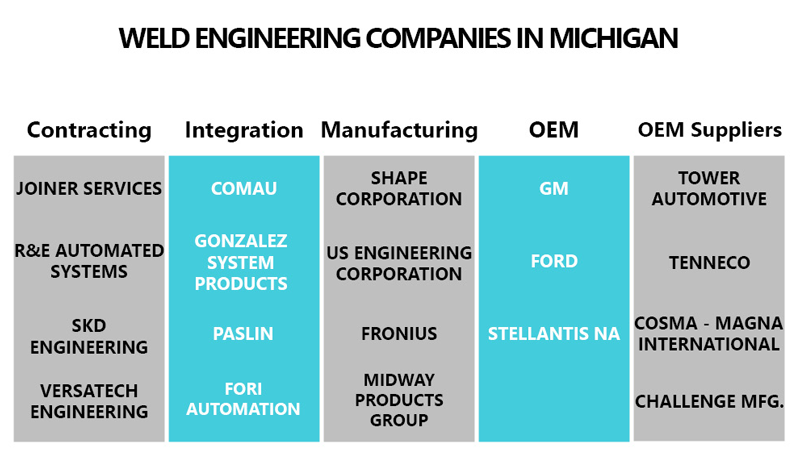
Weld Engineering Launch And Manufacturing Support:
Often, weld engineers must support launch and manufacturing activities. These are the top tasks a welding engineer might be asked to do.
- Support the maintenance department by troubleshooting weld equipment and implementing continuous improvement activities of weld equipment.
- Support the quality department with producing qualified parts.
- Support Environmental Health & Safety (EHS) with safe working practices and environment.
- Be available to provide on-call support for all welding processes to meet client demands, if and when necessary.
- Develop plans that provide risk mitigation strategies for all welding activities.
- Participate in regular meetings discussing the status of welded processes.
- Provide welding technical solutions and input for tool designs and weld development.
- Provide the cost analysis for purchasing welding consumables, accessories, equipment, and spare parts.
- Communicate and share weld information with co-workers to ensure standard project launching practices.
- Continuously challenge weld activities and identify opportunities to reduce cycle time, scrap, and costs while increasing throughput.
Find Welding Jobs in Michigan.
Below, I list some essential duties each candidate should do when trying to find job opportunities.
- It is important to make sure your credentials and skill level, meet the customer requirements listed by the employer before applying.
- The job opening will share a detailed job description and its work requirements during the application process, so make certain you read and review them before sending in your resume.
- Many of the larger employers will conduct an initial phone interview before a face-to-face interview to determine whether or not you will be a great candidate for the job.
- Other considerations include the health benefits offered, retirement plans, and annual salary.
What are a weld engineer’s job responsibilities?
Welding engineers are responsible for designing, developing, and maintaining welding processes and equipment. Their main job is to ensure that welded structures meet the required quality, cost, and performance specifications. Below, I list some specific responsibilities of a typical welding engineer job.
- Develop and test welding processes: Welding engineers are responsible for developing welding processes and procedures that meet industry standards and specifications. They also conduct testing and analysis of the welding process to ensure quality, efficiency, and safety.
- Select welding equipment: Welding engineers are responsible for selecting the right welding equipment for specific projects. They evaluate equipment performance and capabilities to determine the most effective and efficient welding method.
- Train personnel: Welding engineers are responsible for adequately training and supervising welders and other personnel to use welding equipment and processes. They may also develop training programs and conduct workshops to educate employees on welding best practices.
- Ensure compliance with specifications: Welding engineers ensure that welding processes and equipment meet industry standards and specifications. They must stay up-to-date on the latest industry regulations and verify compliance with all relevant specifications.
- Monitor weld quality control: Welding engineers are responsible for monitoring the quality of welds and ensuring that they meet the required specifications. They may conduct inspections, perform tests, and use various measuring tools to ensure that welded structures are safe and reliable.
- Troubleshoot welding issues: Welding engineers are responsible for identifying and resolving issues with the welding process and equipment. They may analyze data, perform root cause analysis, and implement corrective actions to address problems.
- Collaborate with other engineers: Welding engineers must collaborate with other engineers, designers, mechanical engineers, project managers, and team members to ensure that welding processes and equipment are integrated into the larger project plan. They must communicate effectively and work closely with others to ensure project success.
What are a weld engineer’s daily activities?
Below, I list some common daily tasks a weld engineer must do.
- Properly collect weld data and use weld analysis to ensure the collected information is supported by the weld data stored.
- Design of experiments (DOI) coordinated at the production level using analyzed weld data.
- Ensure timely execution of planned downtime activities.
- Help to provide weld process and design improvements in the most cost-efficient manner.
- Perform cost justifications on welding equipment, spare parts, and weld consumables.
- Create good relationships with co-workers and effectively communicate with team members, clients, and suppliers.
- Be able to make independent decisions.
- Able to communicate effectively to leadership.
- Use scientific methods for problem-solving with weld issues.
- Anticipate and recognize the existence of weld problems by using the weld data and innovative ideas.
- Commit to providing a solution in a timely manner and have a realistic approach to implementing a weld solution.
Weld Engineering Salary:
Depending on their experience and knowledge in the industry, earnings can eclipse the $100,000 mark early in their weld engineer career, especially those who chose to do contract work. The chart below shows the national average weld engineer salary.
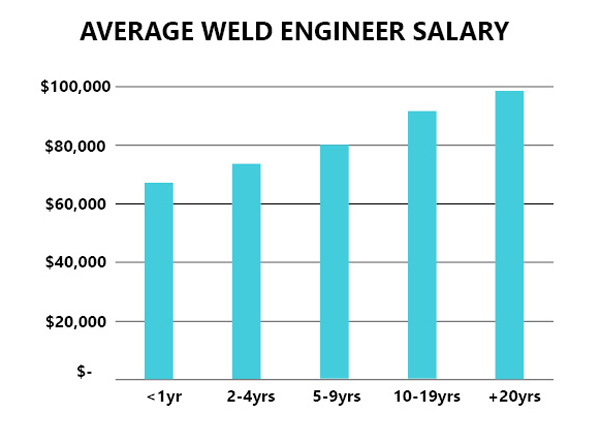
What salary should you expect working as a weld engineer in Michigan?
Michigan weld engineers have an average salary of $67,885, but many weld engineers earn well into the six figures. The weld engineers who make above $100,000 often gain experience with robotics, controls, mechanical, materials, joining technology, or electrical engineering as they advance their careers. The average salary as a welder in Michigan is around $44,859, while a certified welding inspector can earn about 35% more.
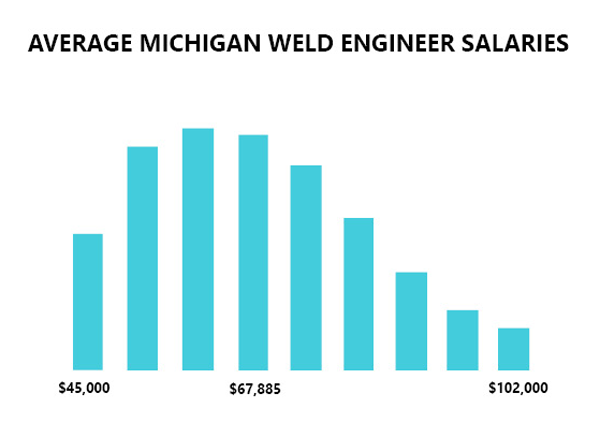
Weld Engineer Job Opportunities in Michigan:
The best thing about working in the welding field is that you can work anywhere in the world. But – one of the best areas for weld engineers is in Michigan. Suppose you want the most profitable opportunity as a welding engineer that starts with an associate degree or bachelor of science degree in welding engineering technology.
You will be fine finding weld engineering jobs in Michigan or wherever you desire. If you consider becoming self-employed, take advantage of the tax credits, more considerable retirement savings opportunities, and higher hourly rates. Consider using the JOINER Services platform to showcase your professional talents. You can register for free online and get connected working on contracts for multiple companies in Michigan and the United States.
Overview of Weld Engineering Jobs In Michigan:
In conclusion, welding jobs in Michigan are abundant. They have multiple universities and colleges around the state where you can receive a degree in welding. There are many different types of industries that you can work in as a welding technician or weld engineer. It is common to find above-average salaries in this state if you have work experience and want a technically challenging career.
The work can be difficult, but it can also be rewarding watching your welded products be created. Many weld engineers stay in this career for a long time because of their opportunities to work with new technologies, assembly processes, and equipment. If you want to grow your career in welding engineering as a contract engineer, contact JOINER Services to help find you more work.
Weld Engineers On JOINER Services:
JOINER Services offers contract weld engineers to support welding projects. If your company needs welding support or if you are looking for work as a welding engineer, JOINER Services can assist. For short-term or long-term contract projects in the welding industry, they can support.

Join now, and find contract weld engineering jobs or weld engineers to support your project.
FREQUENTLY ASKED QUESTIONS:
Below, I list some FAQs that are often asked about welding engineering.




